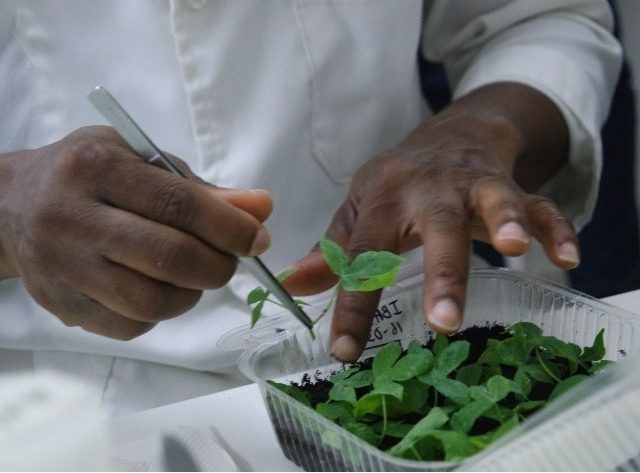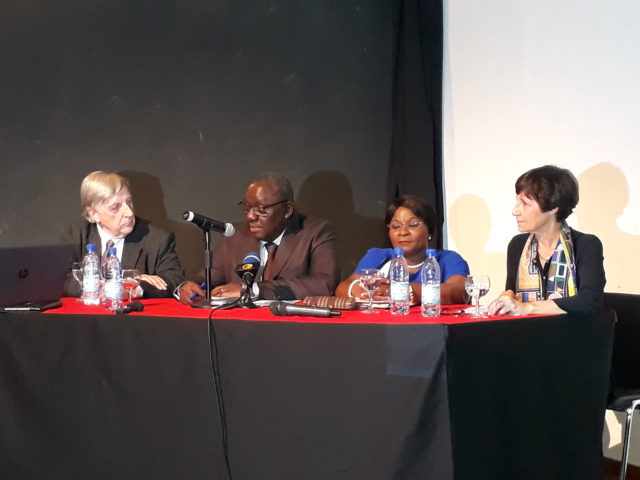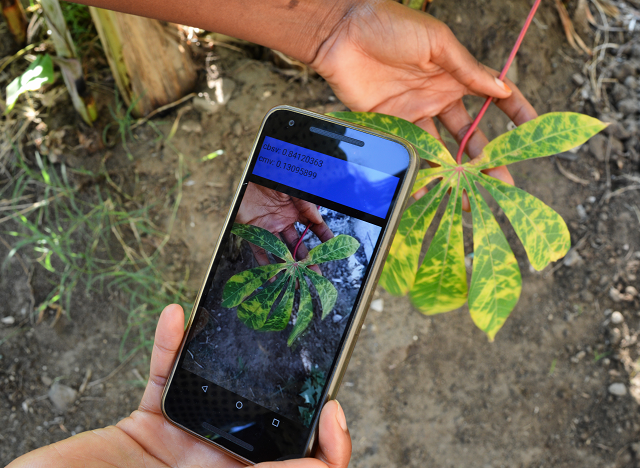For Immediate Release
(12 December 2013) The CGIAR Research Program on Roots, Tubers and Bananas (RTB) and the Global Cassava Partnership for the 21st Century (GCP21) have joined forces in order to strengthen efforts to increase cassava production in some of the world’s poorest countries and to tap that crop’s full potential for preventing hunger, improving nutrition and reducing poverty.
Cassava, a tropical crop that is the source of tapioca, is consumed by at least 800 million people around the world. Cassava production is on the rise in much of Africa and Asia, largely thanks to demand caused by population growth and the food industry. Development experts have cited cassava has a vital crop for the 21st century due to its resilience in response to climate stress, but at the same time, it is being decimated in some African regions by cassava brown streak disease and cassava mosaic disease.
GCP21 and RTB have teamed up to facilitate efforts to control those diseases and enhance cassava production and market opportunities. Both organizations work with a wide range of agricultural research institutions, development agencies and other partners, and they aim to expand the level of cooperation and commitment to facing such threats.
“Cassava is full of promise for feeding the world, but it is also threatened by many pests and diseases. The time has come to team up on a global level to optimize scientific and technical investment, address gaps in research and development, and prepare for climate change. The alliance between RTB and GCP21 will ensure the level of cooperation that such challenges demand,” said GCP21 Director Claude Fauquet.
Launched in 2012, RTB brings together the expertise and resources of five agricultural research centers dedicated to improving the lives of small farmers across the developing world. Two of those centers – the International Center for Tropical Agriculture (CIAT) and the International Institute of Tropical Agriculture (IITA) – are global leaders in cassava research for development. GCP21 was created in 2002 and is a multi-partner organization that advocates for cassava research in key areas, and convenes its members for targeted action, fundraising and communication.
RTB Director Graham Thiele said, “GCP21 brings together broad participation and deep scientific knowledge. I am very pleased to be able to consolidate this alliance and look forward to doing great things together.”
GCP21, with its secretariat based at CIAT, organizes a triennial international scientific conference to review advances, and also smaller brainstorming meetings on critical issues in cassava improvement, production and use. Its recent activities include establishing a global alliance to declare a war on cassava viruses, evaluating options for preserving valuable cassava landraces in Africa, and developing a cassava-based livestock feed system in Africa.
RTB supports the development of disease resistant and bio-fortified cassava varieties by its member centers and their partners. RTB is also supporting a major effort to study the crop’s genome and metabolites, and use that information to enhance cassava-breeding programs. The new alliance will build upon GCP21’s decade of networking, lobbying and communication for the benefit of cassava research.
For more information, please contact: c.fauquet@cgiar.org or g.thiele@cgiar.org
Background Information:
The CGIAR Research Program on Roots Tubers and Bananas (RTB) is an international collaboration of agricultural research centers that work with RTB crops – cassava, potatoes, sweet-potatoes, yams, bananas, plantains and lesser-known roots and tubers. Those centers Bioversity International, the International Center for Tropical Agriculture (CIAT), the International Institute of Tropical Agriculture (IITA), are the International Potato Center (CIP), the RTB lead center, and French partners represented by the French Agricultural Research Centre for International Development (CIRAD) – have joined forces to improve the food security, nutrition and livelihoods of some of the world’s poorest families. www.rtb.cgiar.org
Global Cassava Partnership for the 21st Century (GCP21) is a not-for-profit international alliance of 45 organizations founded in 2002. It aims to fill gaps in cassava research and development in order to unlock the potential of cassava for improving food security and also increasing incomes of poor farmers through work to develop industrial products from cassava. Coordinated by Claude Fauquet and Joe Tohme, of the International Center for Tropical Agriculture (CIAT), GCP21 is providing updated information regarding the crop, the scientists working on cassava and cassava research around the world. http://ciat.cgiar.org/gcp21
The International Center for Tropical Agriculture (CIAT) – a member of the CGIAR Consortium – develops technologies, tools, and new knowledge that better enable farmers, especially smallholders, to make agriculture eco-efficient—that is, competitive and profitable as well as sustainable and resilient. Eco-efficient agriculture reduces hunger and poverty, improves human nutrition, and offers solutions to environmental degradation and climate change in the tropics. With headquarters near Cali, Colombia, CIAT conducts research for development in tropical regions of Latin America, Africa, and Asia. www.ciat.cgiar.org
The International Institute of Tropical Agriculture (IITA) – a member of the CGIAR Consortium – is a nonprofit research-for-development organization that works with partners in Africa and beyond to enhance food security and improve livelihoods. Over the past three decades, IITA has played a key role in fighting poverty by reducing producer and consumer risks, enhancing crop quality and productivity, and generating wealth from agriculture. IITA headquarters are in Ibadan, Nigeria. www.iita.org



